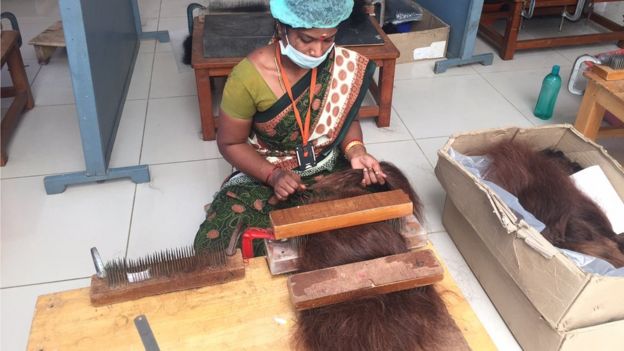
Every year millions of people travel to two temples in southern India, hoping for an answer to their prayers. But every miracle requires a sacrifice - and many pilgrims sacrifice their hair.
Gopala Amma is desperate to reverse her family's bad fortune. They are in danger of losing the one room they share off a small alley in the Chennai suburb of Param Bur.
Amma works hard as a cleaner but is struggling to make ends meet. Her husband has lost his job and has begun to drink heavily, while her eldest son is failing in his studies. All this has prompted Amma to think of asking the Hindu gods for help.
"I have decided to go to the temple at Tirutanni and shave my hair. That way, the gods will bless me and my family," she says.
This will not be just a snip but a full head shave - all 81cm (32in) of her long wavy locks will go. By sacrificing something so beautiful to the gods, by shedding her ego, she hopes they will bless her with good luck in return.
Human hair is valuable in India. Many of Amma's female neighbours collect hair from their combs to sell or barter to the hair collectors who come once a month on scooters calling for "comb waste".
They either trade the hair for pots or are given a few rupees, depending on the weight. The collectors then sell it to the factories.
But comb-waste hair tangles. Shaved hair is more highly valued because continues to fall naturally, as it did on the original owner's head, and can be used to make a lifelike wig.

From Hollywood to the UK to South Africa, the most widely used human hair is Indian, as its texture resembles Caucasian hair, which the hairdressing industry deems desirable.
To India, the market is worth more than $250m (£175m) annually. A kilo of shaved hair fetches up to $130 (£91), so a long head of hair such as Amma's - which comes to about 160g (6oz) - will be worth about $20 (£14).
But for Amma this is not important.
The practice of hair-shaving - or "tonsuring" as it is termed when done for religious reasons - is associated with an ancient Hindu myth.
There are several versions of the myth but they centre on the god Vishnu, who was hit on the head with an axe, causing him to lose a section of his hair. The angel Neela Devi then offered a lock of her hair as a replacement, and Vishnu was so grateful that he thereafter granted wishes to anyone who offered their hair as a sacrifice.
The southern states of Tamil Nadu and Andhra Pradesh are where most hair tonsuring in India takes place. Two of the main Hindu temples, in the towns of Tirutanni and Tirupati, collect tonnes of human hair every month.
Around the temple compounds, in long halls known as Kalyankattan or "places of happiness", hundreds of barbers dressed in white sit in rows, with pilgrims at their feet.
"I feel quite shy having no hair but I am happy," explains one pilgrim who has just had her head shaved at Tirutanni.
Auspicious days may be chosen for the ritual. One family is celebrating the parents' 29 years of happy marriage. For another, it could be a sickness in the family or a pattern of bad luck that brings them here.
For Amma, who is 36, it is her last resort. Her husband's drinking has become incessant. She is determined not to lose her home and believes this is the only way to reverse her fortune.
"The gods will bless me if I do this," she says as she climbs the temple's steps.
Sitting down cross-legged in front of the barber with her head bent forward, Amma smiles. The barber wets the crown of her head and takes his razor blade, slowly scraping at her skull. Her hair barely reaches the ground before it is gathered up and placed into a lockable blue barrel.
Hair traders collect the barrels every week. Many temples form contracts with traders, while others hold auctions, selling it to the highest bidder.
Tirupati temple, the largest collector of human hair in the world - and also the most visited holy place in the world, with an average of 100,000 pilgrims per day - nets an average $3m (£2.1m) a year from this trade.
The money is used for charitable work, schools and maintaining the temple grounds.
The barbers themselves are paid for their trouble - 15 rupees (20c or 16p) per shave.
The shaving process is very quick, and those presenting their hair to the gods just sit down, put their heads in the hands of the barbers and then go.
Afterwards, however, they visit the temple to show their freshly-shaved scalps to the gods, so they can be blessed for their sacrifice.
Amma looks at herself in the mirror and laughs at her changed appearance. She touches her head and says she likes the feel.
"As the barber was shaving I felt my problems lifting away. Now things are going to get better."
She says she does not know where her hair will go. Told that traders sell it to make wigs and extensions all over the world, she laughs again.
"If it makes someone else look beautiful then I am happy," Amma says, before heading out of the temple and beginning her journey home, to see if her life will change.Afterwards, however, they visit the temple to show their freshly-shaved scalps to the gods, so they can be blessed for their sacrifice.
Amma looks at herself in the mirror and laughs at her changed appearance. She touches her head and says she likes the feel.
"As the barber was shaving I felt my problems lifting away. Now things are going to get better."
She says she does not know where her hair will go. Told that traders sell it to make wigs and extensions all over the world, she laughs again.
"If it makes someone else look beautiful then I am happy," Amma says, before heading out of the temple and beginning her journey home, to see if her life will change.




